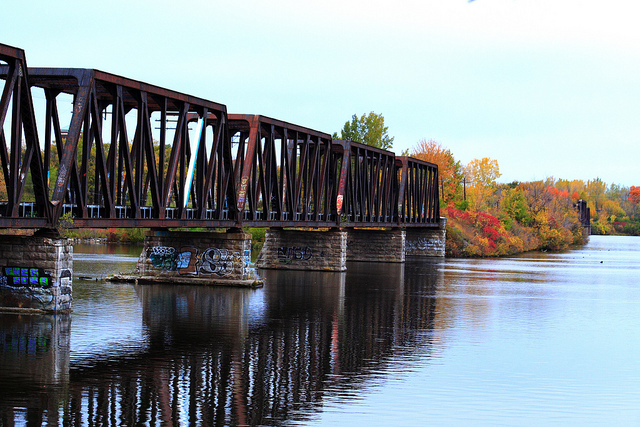Standing idle in the heart of the nation’s capital, the Prince of Wales rail bridge embodies the absurdity of Canadian transport policy. Repeated efforts to repurpose this historic 134-year-old structure as a public transit link across the Ottawa River have failed.
The “O-Train,” Ottawa’s 8-kilometre passenger rail line, terminates a few hundred metres from the bridge. On the Quebec side of the river, the rail right-of-way is occupied by the “Rapibus” transit corridor, which also stops just short of the river. Buses in the corridor have suffered 15 collisions since the service began in October 2013. One in April 2014 sent 17 people to hospital. Travel times have actually lengthened for some Gatineau commuters, particularly those crossing the river.
No mass transit connection exists between Canada’s two largest provinces. The rail bridge rusts away, as tens of thousands of commuters sit in traffic jams in their idling cars and buses, wasting time and burning increasingly scarce and expensive fossil fuels.
Whose responsibility is it to connect the rail line across the river and provide passenger service? Not the federal government, not the provinces of Quebec and Ontario, not the cities of Gatineau and Ottawa…
This lack of leadership in our nation’s capital is a microcosm of what is happening right across Canada. CN and CP Rail have ripped out thousands of kilometres of tracks in the past two decades, encouraged by section 146 of the Canada Transportation Act:
… the railway company may discontinue operating the line on providing notice of the discontinuance to the Agency. After providing the notice, the railway company has no obligations under this Act in respect of the operation of the railway line and has no obligations with respect to any operations by any public passenger service provider over the railway line.
After inter-urban rail corridors are abandoned, keeping them in public hands becomes a major challenge, downloaded to cash-strapped rural municipalities on a piecemeal basis.
Is anyone designing a sensible national transportation system? What would one look like?
In a 2012 report, Building a Sustainable and Desirable Economy-in-Society-in-Nature, York University professor Peter Victor and his colleagues envision transportation (plus energy, housing and industrial infrastructure) in a future world that is ecologically sustainable, fair, efficient and secure:
… single-occupancy vehicles are now rare. The dominant modes of transportation within communities are walking and bicycling; between communities people use high-speed rail. Public transportation is important within communities and is designed to transport goods as well as passengers, making it convenient for grocery shopping and the like. Because so many people use public transportation, it is abundant and extremely convenient. Rail is common, but so are electric buses and taxis. “Traffic” is a thing of the past, and public transportation gets people around much more quickly than private vehicles used to, at a fraction of the cost.
Their report provides a blueprint for achieving this vision. It includes improving macro-economic and regional coordination, reversing consumerism, expanding the commons, placing systematic caps on natural resources, sharing work time, tackling inequality, and redirecting technology toward sustainable solutions. All these are elements of a transition to a sustainable and desirable economy, according to Victor and his fellow ecological economists.
They admit that these ideas are not new. But, they assert, what is new is that we have reached the point of no return. Transition will happen; indeed, is happening at an ever-increasing rate. But we do have a choice about the nature of this transition: “We can engage in a global dialogue to envision “the future we want”… and then devise an adaptive strategy to get us there, or we can allow the current system to collapse and rebuild from a much worse starting point.”
Stephen Harper’s Canada is making dialogue and transition far more difficult, and collapse far more likely — not only for Canadians, but for people around the world. Stubbornly and blindly promoting fossil fuel exploitation as the be-all and end-all of governments, clinging to outmoded economic models, shutting down forums for dialogue such as the National Round Table on the Economy and the Environment: this brand of dysfunctional government is extremely unhelpful if we want a decent future for our children.
Ole Hendrickson is a retired forest ecologist and a founding member of the Ottawa River Institute, a non-profit charitable organization based in the Ottawa Valley.
Photo: Michelle Tribe/flickr




